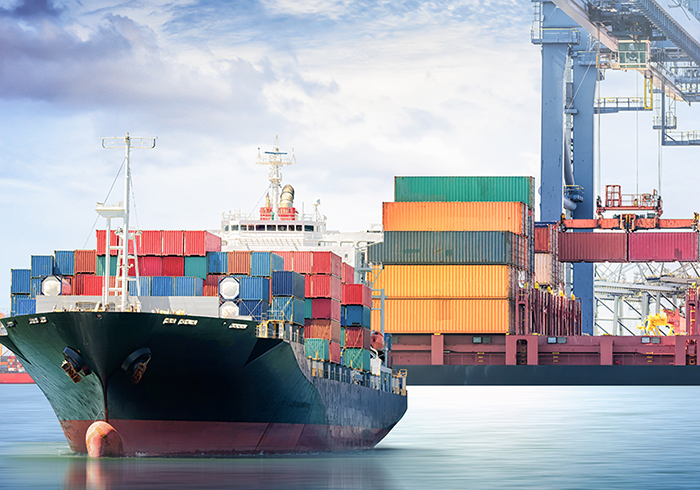Three years ago, the Chinese port of Qingdao was home to one of trade’s most infamous fraud cases. Finbarr Bermingham explores the lasting impact.
In December 2016, Citi and Mercuria drew a line under one of the greatest sagas commodity trading – a sector not estranged to high drama – has known. The pair reached an undisclosed settlement over an alleged metals financing fraud in the Chinese port of Qingdao in 2014, which they had been battling out in London’s High Court ever since.
The case concerned a repurchasing agreement (repo) worth US$270mn. Mercuria had sold metal stocks worth this amount to Citi, under an agreement to repurchase it at a higher price at a later date. The metals were held at Qingdao and the nearby smaller port of Penglai, also in China. Or were they?
For anybody in the trade finance industry, the word “Qingdao” has in the three years since 2014 taken on a Pavlovian quality, transposable for “fraud” and guaranteed to get tails and tongues wagging. The metals may or may not have existed, and it was this existentialist quandary that propelled them and Decheng Resources, which claimed ownership of the metals, to fame.
The company, a private metals trader, used fake warehouse receipts to secure multiple loans, using single cargoes of copper and aluminium as collateral. Along with Citi and Mercuria, big hitters such as Standard Bank, Standard Chartered, HSBC, Glencore and Trafigura were all exposed to the irregularities, with combined international losses pertaining to the Qingdao fraud thought to run in excess of US$1bn. It was estimated that the fraud left Chinese banks exposed by more than US$3bn.
The CEO of Decheng wound up in prison and the fraud spawned a cottage industry in metals litigation – including Citi vs Mercuria. Because the authorities have had Qingdao’s warehouses on lockdown since the fraud, neither party has been able to assess their exposure to fraudulent receipts. This led to a High Court case, with both parties claiming the other was liable for the US$270mn. The ruling was ambiguous (although it confirmed the legitimacy of repo transactions in general), and the decision to settle suggests neither had the appetite for a rerun.
May 2017 will mark three years since the authorities began their investigation into Decheng’s multiple warehouse receipts, leading many to predict that it would change metals trading, warehouse financing and collateral management forever. It seems like a logical time to explore the legacy of Qingdao.
Running scared
Late last year, when the collapse of the Korean container shipper Hanjin was sending shockwaves throughout Asia Pacific trade, Mark Evans, head of transaction banking at ANZ, compared it to the Qingdao fraud. It’s one of those moments, he told GTR, when every bank – whether they are financing the company in question or not – rifles through their supply chains and client base, looking for connections or exposure.
“The first thing you do is get a message to our staff and therefore our customer, to say if you’re dealing with this company take extra care. Then we looked at what was on our books, which is a lot easier said than done, I can assure you. Trading 28 different countries, getting down into that detail… you may have an invoice or purchase order, but what’s the bill of lading sitting behind it? You’ve actually got to scan through the documents and find them. Then trying to understand which customers might be impacted if there’s a delay. If the goods were truly being captured at the port, for how long? Was there a risk of spoilage? Were they frozen goods or finished goods? What’s the knock-on effect?” he explained.
It sounds chaotic, and by all accounts, that’s a fair description of how things were immediately post-Qingdao. For banks, one of the major concerns was the validity of the repo as a transaction: if the court had ruled in favour of Mercuria, which bank would have been comfortable entering into a repo with a trader with a diluted guarantee they would get their money back?
Even after the judge confirmed the repo was legit, Linos Choo, a litigation partner at DLA Piper in London, says he was expecting a host of calls from banks looking to redraw their structure, in order to protect themselves further. But, he tells GTR, that hasn’t happened. “It’s basically status quo as far as repos are concerned,” he says.
The strength of the repo was upheld, the reputation of metals and warehouse financing in China was not. International banks have always had a complex relationship with China’s metals sector. A host of commercial banks have come and gone in the decade following the financial crisis.
In the past few years, Barclays and Deutsche Bank exited commodity trading in China, while Standard Chartered stopped physical metals trading there (note, some of these banks still finance metals and commodities, without trading them, according to documents seen by GTR). In 2015, it was rumoured that Citi was also exiting the business, a story a bank spokesperson denied to us at the time.
Qingdao has spooked the banks further still. It’s telling that three years on, none of those directly affected by the fraud were willing to go on the record to discuss how they have bolstered their security against future fraud. Anecdotal evidence from the market, however, shows that it has led to a more conservative approach to financing.
“Qingdao is not the only major case, it was one that we heard about because of the amount at stake. At the same time you had other scandals, lower amounts, but we’ve always had fraud. But this one has led to some major changes,” says Félicia Soumah, the CEO of Ace Global Depository, a collateral management company.
She says that major banks have cut back on financing metals and that funds have become more involved as a result. The Qingdao fraud was so wide-reaching, it led to a complete rethink from banks financing warehouse receipts: “Somehow it’s a genius thing from the guy who did the fraud. He really knew the system and what the gap in the system was and he really played with it,” Soumah says.
She adds: “It just takes one fraud and then the bank is restricting the amount of finance they are using in the area because it’s quite risky. That’s the main issue. Even if the bank is not involved, it looks at the other banks and says: ‘Be careful, look what happened to them, that could be us.’”
Taking stock
The fraud saw an immediate exodus of commodities from Qingdao port, to be stored elsewhere in Asia, including Shanghai, Busan and Malaysia. The long-term effect on warehousing, however, has been mixed. Look at the varying strategies of two of the world’s biggest commodity traders: Trafigura and Mercuria. Both companies were exposed to the fraud, but have taken very different approaches in the three years since.
Trafigura announced in 2015 that it was completely exiting its metals warehousing business in China, conducted through its logistics subsidiary Impala Terminals. The official reason cited was “slowing market conditions”, but Trafigura’s 2016 annual report shows that the company still harbours reservations about warehousing in China.
It reads: “Impala has issued warehouse certificates, and also has a limited number of collateral management agreements in place regarding metal stored at these locations [Qingdao and Penglai]. The position remains that it has not been possible to independently verify the quantity and ownership of the metal stored at these locations and consequently legal proceedings have been commenced in England and China relating to ownership of the metal and potential liabilities regarding the storage arrangements.”
Mercuria, on the other hand, has taken a circuitous route to deepening its ties with the Chinese warehousing sector, post-Qingdao. In October 2014, it purchased the physical commodities business of JP Morgan. As part of the acquisition, it inherited metals storing company Henry Bath. At the beginning of 2016, China Materials Storage and Transport Development Company (CMSTD), a Chinese warehousing giant, acquired a majority stake in Henry Bath, in a move that business leaders said would expand its warehousing operations in the country.
Rather than being frightened off, Mercuria appeared to use the Qingdao scandal to strengthen its control over how its commodities are stored in China. When it was announced last year that Henry Bath, Mercuria and CMSTD were the pilot partners for the LME Shield, a new central electronic register for storing warehouse receipts from the London Metal Exchange (LME), this view was reinforced.
The significance of LME Shield in this story cannot be overstated. The solution was developed by the exchange in response to direct market demand for increased security following Qingdao and, along with other technological investments, is arguably the most important and lasting legacy of the fraud.
“The real legacy is that it has accelerated the need to find fraud prevention in trade finance, things like LME Shield, which has been set up to track metals,” says DLA Piper’s Choo, who also mentions the various blockchain developments, most notably by DBS and Standard Chartered, who have combined to launch Trade Safe, a solution that looks to reduce risk of multiple-invoice fraud faced by trade finance banks.
LME Shield provides electronic receipts as proof of ownership for stored material. It was designed to inspire confidence in LME warehouses, which had seen a sizeable reduction in trade volumes and withdrawals from its warehousing network since it was acquired by the Hong Kong Stock Exchange in 2012. By providing a failsafe way of ensuring receipts cannot be edited or duplicated, it is offering a solution to the Qingdao problem and is now looking to expand into China.
“We started with LME Shield because we were asked by the industry to provide a service as a direct result of that [Qingdao],” Oscar Wehtje, strategic projects head at the LME, tells GTR. “From my perspective the real benefit of Shield is that you can’t lift the warehouse receipts, there’s only one that can exist in the system. It’s not possible to create a copy. If you tried to multi-pledge a receipt to multiple banks, the system wouldn’t allow you to do so. It has those safeguards in place.”
In October 2016, the LME launched a one-year pilot scheme with Henry Bath that will see the company use Shield to track material stored in China outside of its warehouse network. Henry Bath will issue receipts for metals stored in Shanghai, with a view to expanding throughout China.
“I think there’s need for a secure and efficient receipt management system everywhere in the world. The Qingdao scandal is obviously a demonstration that was the case in China three years ago. But you have other stories in Asia which show that it is not only in China. It is a risk everywhere,” Wehtje says.
Wehtje is, of course, right. In January, Glencore discovered forged warehouse receipts for its Access World storage unit. It is believed that the receipts covered a number of Asian jurisdictions. In 2015, Glencore was ordered to pay US$40mn to a Romanian petrol company for fraudulently shipping low-quality oil in the 1990s.
Qingdao was not the first, nor will it be the last case of fraud in the commodities business. It is, however, the case with the highest profile. It still provokes looks of concern when mentioned to trade finance bankers and commodity traders in Asia. But if Qingdao’s example can inspire change in an industry for which fraud is a real problem, then perhaps its name will become less toxic in the years to come.








